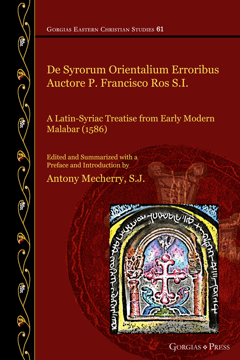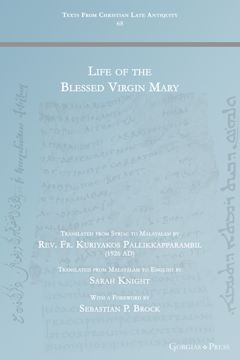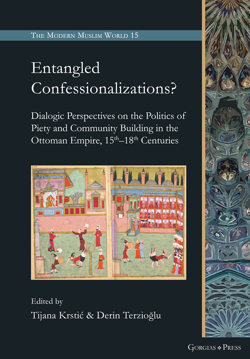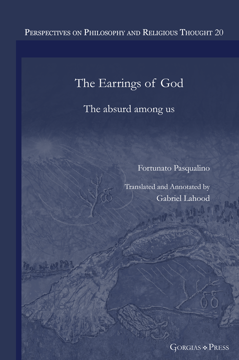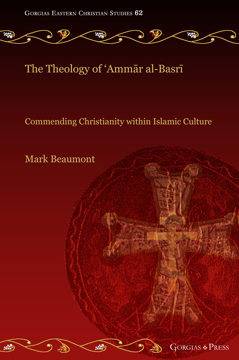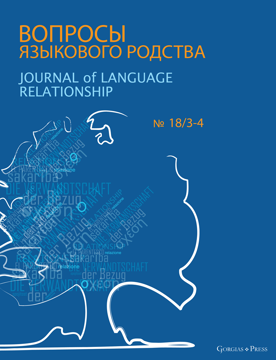De Syrorum Orientalium Erroribus, Auctore P. Francisco Ros S.I.
A Latin-Syriac Treatise from Early Modern Malabar (1586)
Edited and Summarized with a Preface and Introduction by Antony Mecherry, S.J.
Series: Gorgias Eastern Christian Studies 61
ISBN: 978-1-4632-4353-1
In the present work, De Syrorum Orientalium Erroribus, Auctore P. Francisco Ros S.I.: A Latin-Syriac Treatise from Early Modern Malabar (1586), Antony Mecherry S.J. brings to the fore a recently identified sixteenth-century treatise on ‘Nestorianism’ written by Francisco Ros S.J. (1559–1624), a Catalonian from the Jesuit province of Aragón, who successfully promoted the mission praxis of accommodatio primarily among the Saint Thomas Christians of early modern Malabar in South India. This newly discovered first treatise composed by Ros, a Latin missionary, represents the initial phase of his mission as a polemicist in the making, who read the Syriac sources of the Church of the East found in Malabar, through a Catholic theological lens. In addition to exploring the underlying conflicts emerged out of an unprecedented encounter of apparently unlike theological and liturgical identities in the same mission field of early modern India, this book provides the readers with a historiographical critique against the backdrop of which the author presents his analysis of the Rosian treatise.
$55.00 (USD) $33.00 (USD)
Life of the Blessed Virgin Mary
Translated from Syriac to Malayalam by Rev. Fr. Kuriyakos Pallikkapparambil (1926 AD); Translated from Malayalam to English by Sarah Knight; With a Foreword by Sebastian P. Brock
Series: Texts from Christian Late Antiquity 68
ISBN: 978-1-4632-4355-5
Different parts of the Life of the Blessed Virgin Mary are known from the second century onwards. Translations and adaptations into Syriac and other languages also became available from very early centuries. The compilation in the Syriac language was translated into Malayalam in 1925, but an English translation containing the full text did not exist at all. This gap has been filled now by this work. Sebastian Brock’s Foreword gives important information on the background and authenticity of the different sources that form the basis of the text. This biography is unique in that it brings together some very early accounts of the birth of Mary, the birth of Jesus, the flight into Egypt, and most importantly, the very rare account of the ‘Dormition’ or ‘falling asleep’ of the Blessed Mother.
$55.00 (USD) $33.00 (USD)
Entangled Confessionalizations?
Dialogic Perspectives on the Politics of Piety and Community Building in the Ottoman Empire, 15th-18th Centuries
Edited by Tijana Krstić & Derin Terzioğlu
Series: Gorgias's Modern Muslim World 15
ISBN: 978-1-4632-4357-9
This volume explores the emergence of discourses of orthodoxy and orthopraxy in the Ottoman Empire between the 15th and 18th centuries, through empirical studies on confessional dynamics in early modern Muslim, Christian and Jewish sources.
$195.00 (USD) $117.00 (USD)
The Earrings of God
The absurd among us
By Fortunato Pasqualino; Translated and Annotated by Gabriel Lahood
ISBN: 978-1-4632-4359-3
Life is full of absurdities, and human misperception of such absurdities leads to a state of unrest and fear that require meaning and direction for a happy life. F. Pasqualino addresses here samples of existential absurdities, and discusses solutions offered: Taoism offers in its paradoxes a natural self-help resource. Buddhism offers a natural wisdom that is informed by a supernatural impersonal Absolute. Hinduism offers a plethora of personal gods who embody the impersonal Absolute. The Judeo-Christian-Islamic wisdom teaches a personal Absolute God whose being is distinct from, but involved with human and non-human beings. The unifying feature of these wisdoms is: Obedience to, and love of, the Absolute can rectify human misperception of life’s absurdities, dissipate fear, and provide meaning, value and a serene life. Jesus Christ, the incarnate Absolute in Christian theology, chose to become an exemplar innocent victim for love, thus giving the most absurd but victoriously redeeming love that provides a new and sublime perspective on life’s absurdities. G. Lahood’s translation and commentary make the Italian masterpiece available to an English-speaking audience.
$123.95 (USD) $74.37 (USD)
The Theology of ‘Ammār al-Basrī
Commending Christianity within Islamic Culture
Series: Gorgias Eastern Christian Studies 62
ISBN: 978-1-4632-4361-6
ʿAmmār al-Baṣrī (d.c. 850) was the first Christian to write a systematic theology in Arabic, the language of the Muslim rulers of ʿAmmār’s Middle East. This study of his two works that were only discovered in the 1970’s seeks to analyse the way he defends Christian beliefs from criticism by Muslims over the authenticity of the Gospels, the Trinity, the divinity of Christ, the Incarnation, the death of Christ by crucifixion, the resurrection of Christ, and the nature of the afterlife. ʿAmmār al-Baṣrī wrote his theology in dialogue with Muslim thinkers of his time and his work offers guidance to Christians in today’s world who live in Islamic contexts in how to relate Christian convictions to a Muslim audience.
$114.95 (USD) $68.97 (USD)
Journal of Language Relationship 18/3-4
Editor-in-Chief Vladimir Dybo; Managing Editor George Starostin; Editorial Secretary Tatiana Mikhailova; Editorial Board Anna Dybo, Manuel Molina, M. N. Saenko & Ilya Yakubovich
Series: Journal of Language Relationship 18/3-4
ISBN: 978-1-4632-4363-0
The Journal of Language Relationship is an international periodical publication devoted to the issues of comparative linguistics and the history of the human language. The Journal contains articles written in English and Russian, as well as scientific reviews, discussions and reports from international linguistic conferences and seminars.
$74.00 (USD)
